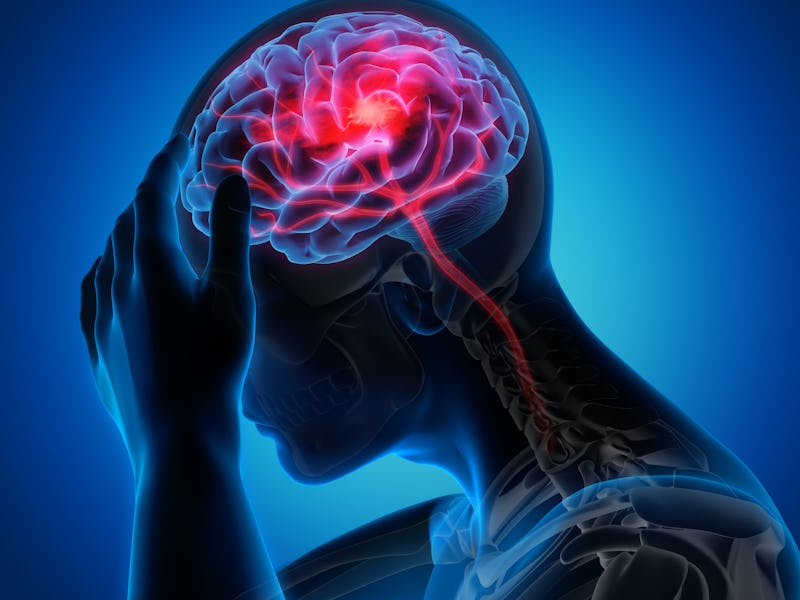Stress "restructures" the brain -- mice study
Production of a 1 crucial element comes screeching to a halt, study shows

Stress has an outsized effect on our brains. Feeling stress can change how your brain develops, with long-term consequences. Chronic stress, meanwhile, can lead to brain conditions like depression and anxiety. But exactly how stress affects the brain is still relatively unknown.
Now, a new study in mice suggests that stress alters specific brain cells
In the study, the researchers looked specifically at the cerebellum, a region of the brain thought to play a big role in regulating our emotional state.
They found that stressing out mice caused a change in the structure of astrocytes, a type of glial cell, in their cerebellum. Astrocytes support the brain by nourishing neurons, as well as acting as the brain’s live-in cleaner, constantly clearing away dead cells. They have a star-like appearance, due to their long, thin branches, called “processes”.
The findings were published Monday in the Journal of Neuroscience.
Being stressed makes your brain better at holding onto memories of fear. So, the researchers wanted to see if making the mice anxious led to a change in the length of the processes of Bergmann glial cells, one type of astrocyte, in the part of the cerebellum that is responsible for forming fear memories. The stress-induced retraction of these cells’ processes may serve to increase synaptic transmission, and consequently, enhance stress-induced memory consolidation.
To do this, the researchers subjected the mice to a stressor. This took the form of exposing them to urine from a fox, their natural predator, which triggered fear in the mice. Using imaging, they observed that the branches of the Bergmann glial cells retracted in response. Just a single exposure to the stressor caused the change to occur within a mere few hours, and was still visible a full twenty-four hours later.
Next, they set out to try and find what molecule was causing this structural change. GluA1, one of the proteins that make up the AMPA receptor, a type of glutamate receptor, is known to play an important role in helping astrocytes to extend their processes. The researchers found that the stress induced by the predator odor suppressed the synthesis of this protein, and led to a retraction of the astrocytes' branches as a result. Stress stimulates the release of the stress hormone norepinephrine, which the researchers think may be the cause of the suppressed production levels of GluA1.
All their findings suggest that during tense times, the brain stops making the protein GluA1. This appears to impair the “bi-directional communication between neurons and astrocytes,” says one of the authors of the study, Si-Qiong Lui, a researcher at Louisiana State University Health Sciences Center.
Lui thinks this alteration could also be taking place in our brains. As many signaling pathways are conserved between species throughout evolution, she says, the brain remodeling that was found to be occurring in the mice may also be happening in humans.
An overload of stress and worry can cause lasting changes in the brain, and lead to the development of mental disorders such as anxiety and depression. These new findings open the door to potential new clinical applications, Lui tells Inverse. Now that this molecular pathway has been uncovered, she says, it may be targeted using drugs for “possible prevention or reversal of stress-induced changes”.
Abstract: Stress alters brain function by modifying the structure and function of neurons and astrocytes. The fine processes of astrocytes are critical for the clearance of neurotransmitters during synaptic transmission. Thus, experience-dependent remodeling of glial processes is anticipated to alter the output of neural circuits. However, the molecular mechanism(s) that underlie glial structural plasticity are not known. Here we show that a single exposure of male and female mice to an acute stress produced a long-lasting retraction of the lateral processes of cerebellar Bergmann glial cells. These cells express the GluA1 subunit of AMPA-type glutamate receptors and GluA1 knockdown is known to shorten the length of glial processes. We found that stress reduced the level of GluA1 protein and AMPA receptor-mediated currents in Bergmann glial cells and these effects were absent in mice devoid of CPEB3, a protein that binds to GluA1 mRNA and regulates GluA1 protein synthesis. Administration of a β-adrenergic receptor blocker attenuated the reduction in GluA1 and deletion of adenylate cyclase 5 prevented GluA1 suppression. Therefore, stress suppresses GluA1 protein synthesis via an adrenergic/adenylyl cyclase/CPEB3 pathway, and reduces the length of astrocyte lateral processes. Our results identify a novel mechanism for GluA1 subunit plasticity in non-neuronal cells, and suggest a previously unappreciated role for AMPA receptors in stress-induced astrocytic remodeling.